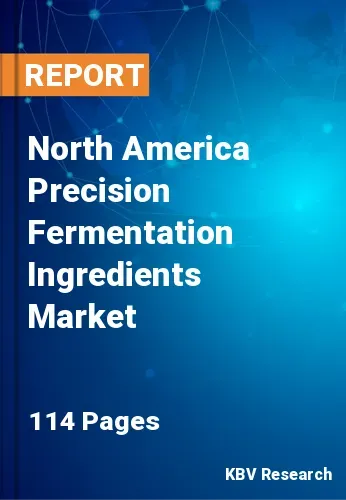The North America Precision Fermentation Ingredients Market would witness market growth of 43.0% CAGR during the forecast period (2023-2030).
Precision fermentation is a technique for producing insulin, vitamins, enzymes, and milk proteins, including casein, whey, and other functional compounds. Precision fermentation is the process of employing microorganisms as cell factories to produce useful substances. The increasing consumption of livestock and products derived from animals raises environmental concerns. The production of foods derived from animals generates a substantial quantity of greenhouse gases, such as carbon dioxide (CO2) and methane, which contribute to the degradation of air quality.
Precision fermentation refers to using microorganisms, such as bacteria, fungi, and yeast, to manufacture various products, such as food, beverages, and pharmaceuticals, and using advanced biotechnology tools, such as genetic engineering, to design and optimize microbial strains for specific applications.
Precision fermentation is the use of microorganisms to produce complex organic compounds. A novel food technology is being introduced to the market. Precision fermentation employs microbial hosts as "cell factories" for making specialized functional components with higher purity standards than primary protein constituents, which are integrated in smaller quantities. Typically, these ingredients require a higher purity level than the primary protein constituents and are added at much lower concentrations. These functional ingredients can enhance the sensory and functional qualities of plant-based products and farmed livestock. Enzymes, flavoring agents, vitamins, natural pigments, and lipids can be produced through controlled fermentation.
According to the National Institute of Standards and Technology (NIST), the food and beverage sector of the region is rapidly expanding in the United States. According to the NIST, the food and beverage sector is the third-largest contributor to the overall manufacturing gross domestic product in the United States. The Food Safety Modernization Act compliance, adopting sustainable packaging and production methods, technological developments, and other issues are only a few of the difficulties faced by the food manufacturing industry. Also, as the region's people have high spendable income, the demand for a luxury lifestyle is increasing. Thus, the hospitality sector in the region is expanding, resulting in regional market growth for the market.
The US market dominated the North America Precision Fermentation Ingredients Market, By Country in 2022, and would continue to be a dominant market till 2030; thereby, achieving a market value of $9,469.1 million by 2030. The Canada market is experiencing a CAGR of 46.2% during (2023 - 2030). Additionally, The Mexico market would exhibit a CAGR of 44.9% during (2023 - 2030).
Based on Ingredients, the market is segmented into Egg White, Collagen Protein, Whey & Casein Protein, Heme Protein, Enzymes, and Others. Based on Microbe, the market is segmented into Yeast, Fungi, Bacteria, and Algae. Based on End Use, the market is segmented into Food & Beverages (Dairy Alternatives, Meat & Seafood, Egg Alternatives, and Others), Pharmaceutical, and Cosmetics & Others. Based on countries, the market is segmented into U.S., Mexico, Canada, and Rest of North America.
Free Valuable Insights: The Precision Fermentation Ingredients Market is Predict to reach $35.1 Billion by 2030, at a CAGR of 43.9%
The market research report covers the analysis of key stakeholders of the market. Key companies profiled in the report include Geltor, Inc., Motif FoodWorks, Inc., Shiru, Inc., Impossible Foods Inc., Perfect Day, Inc., The Every Company, Imagindairy Ltd., New Culture Inc., Eden Brew Pty Ltd and Helaina Inc.
By Ingredients
By Microbe
By End Use
By Country

Our team of dedicated experts can provide you with attractive expansion opportunities for your business.

